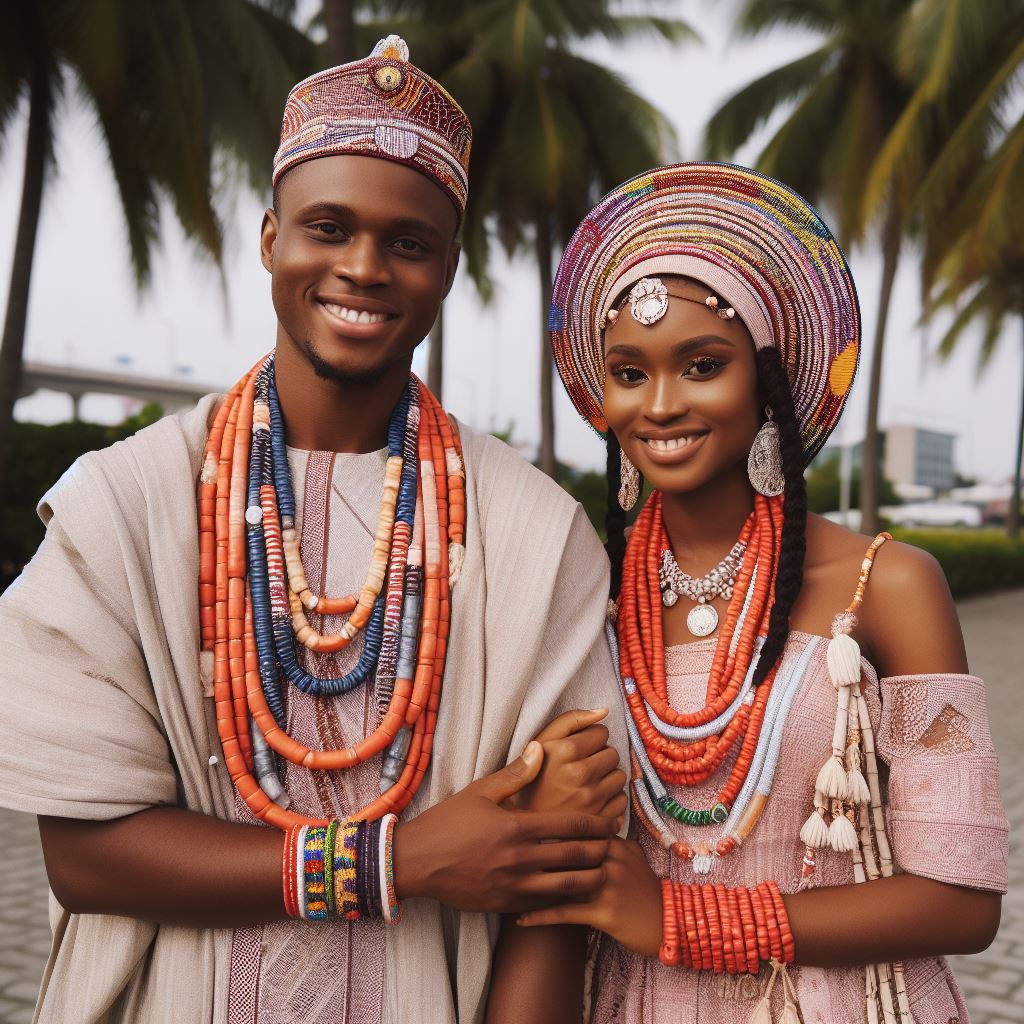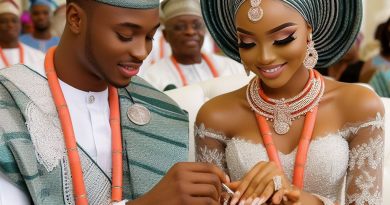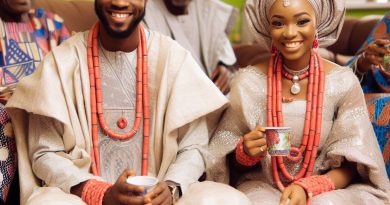The Shift in Marriage Messages over Generations in Nigeria
Last Updated on January 28, 2024
Introduction
A. Brief overview of the traditional views on marriage in Nigeria
Marriage in Nigeria has undergone significant transformations in recent generations.
Traditionally, marriage was viewed as a union of two families, rather than just two individuals. It was a way to strengthen social ties and preserve cultural practices.
B. The significance of marriage in Nigerian culture
In the past, arranged marriages were the norm, with parents playing a central role in selecting spouses for their children.
People considered love and personal preferences as secondary to maintaining family honor and financial stability. The emphasis rested on fulfilling family obligations and producing offspring.
However, societal changes and exposure to Western cultures have influenced the shift in marriage messages among younger generations in Nigeria.
The concept of love and companionship has gained more prominence, challenging the traditional views.
Today, young Nigerians value personal choice, compatibility, and emotional connection in their marriage partners.
They prioritize individual happiness and believe that love should be the foundation of any successful marriage. Consequently, the role of parents in choosing marriage partners has diminished.
Furthermore, religion continues to shape the marriage messages in Nigeria.
Many Nigerians still hold the religious belief that marriage is divinely ordained, and it represents a sacred covenant between a man, a woman, and God.
Religious teachings promote the values of commitment, faithfulness, and mutual respect within a marital relationship.
In review, the shift in marriage messages in Nigeria reflects the changing attitudes and values among younger generations.
While traditional views and cultural significance still hold influence, love, personal choice, and companionship have become integral to the modern understanding of marriage in Nigeria.
This transformation highlights the dynamic nature of Nigerian society and its adaptation to global influences.
Marriage Messages in the Past Generation
A. Traditional roles and expectations of husbands and wives
- Men were expected to be the provider and protector of the family.
- Women were expected to be obedient and submissive to their husbands.
- Strictly defined gender roles had men as the breadwinners and women responsible for household duties.
- Decision-making within the family was under the control of husbands.
- Marriage was viewed as a union between two families, not just individuals.
B. The importance of arranged marriages
- Parents and extended family members played a significant role in partner selection.
- People believed that arranged marriages ensured social status, compatibility, and financial stability.
- In marriage, love and personal preferences often received little importance.
- Marriages were primarily considered a union between families rather than being based on individual desires.
- Arranged marriages were viewed as a way to preserve cultural and social customs.
C. Procreation and continuation of family lineage
- People considered the primary purpose of marriage to be bearing children.
- Couples were expected to have children soon after they got married.
- Parents put pressure on their children to have grandchildren to continue the family name.
- A childless marriage often viewed as a failure and brought shame to the couple.
- Having a large family was seen as a sign of wealth, fertility, and social status.
D. Social and economic considerations in partner selection
- Marriages were often a means to strengthen social connections and alliances.
- Economic background and social status played a crucial role in partner selection.
- Individual desires and personal compatibility were secondary to these considerations.
- Marriages were seen as a transaction between families, with dowry being an important factor.
- Family reputation and honor were associated with the choice of a marital partner.
Throughout the past generation in Nigeria, marriage messages reflected traditional roles, the importance of arranged marriages, the emphasis on procreation, and social and economic considerations.
These messages shaped the expectations and decisions of individuals when it came to marriage, often prioritizing societal and familial interests over personal preferences and desires.
The Shift in Marriage Messages in the Present Generation
A. Influence of Western Culture and Globalization on Marriage Ideals
Marriage messages in Nigeria have shifted due to the impact of Western culture and globalization.
Western ideals, such as individualism and independence, have influenced Nigerian couples to prioritize personal happiness.
Traditional views of marriage, which focused on duty and family expectations, have faced challenges.
B. Changing Gender Roles and Expectations within Marriages
Another factor contributing to the shift in marriage messages is the changing gender roles and expectations.
In the present generation, women are pursuing careers and seeking equality within marriages.
Men are increasingly taking on domestic responsibilities, challenging traditional gender norms.
C. Rise of Love Marriages and Personal Choice in Partner Selection
Love marriages and personal choice in partner selection have gained popularity in the present generation.
Young people are prioritizing compatibility, emotional connection, and shared values when choosing a spouse.
This shift has challenged the traditional practice of arranged marriages and parental influence.
D. Shift from Procreation to Individual Fulfillment and Happiness in Marriages
Marriage messages in Nigeria have shifted from the emphasis on procreation to individual fulfillment and happiness.
Couples are focusing on companionship, emotional support, and personal growth within their marriages.
The expectation of having children is no longer seen as a primary purpose of marriage.
Overall, the present generation in Nigeria is experiencing a significant shift in marriage messages.
Influence from Western culture and globalization, changing gender roles, the rise of love marriages, and the shift towards individual fulfillment have all contributed to this change.
These shifts reflect the evolving values and aspirations of Nigerian couples in their pursuit of a satisfying and meaningful marital relationship.
Read: Biblical Marriage Messages: Their Relevance in Nigeria Today
Factors Contributing to the Shift in Marriage Messages
A. Education and exposure to alternative values and beliefs:
- The spread of education has expanded people’s horizons and challenged traditional marriage ideals.
- Access to information and exposure to different cultures have influenced Nigerians to question old marriage norms.
- Younger generations are more likely to embrace progressive ideas about gender roles and relationships.
- Education has empowered individuals to make informed choices regarding their marital life.
- Increased awareness of human rights has led to the rejection of oppressive marital practices.
B. Economic empowerment of women and increased gender equality
- The rise of women in the workforce has challenged traditional gender roles within marriages.
- Financial independence provides women the freedom to make decisions regarding their marital life.
- Women’s increased economic contributions have raised their expectations for equality within marriage.
- Gender equality movements have empowered women to seek more fulfilling and respectful partnerships.
- Women’s growing economic influence has shifted power dynamics in marriages.
C. Influence of media and technology in shaping societal perspectives
- Media has played a significant role in disseminating progressive ideas about marriage and relationships.
- Television shows, movies, and social media platforms have introduced alternative marriage narratives.
- Increased access to the internet has allowed Nigerians to explore diverse perspectives on marriage.
- Technology has created a virtual space for open discussions and challenging traditional marriage values.
- The influence of media and technology has given rise to more inclusive and tolerant attitudes towards marriage.
Various factors can be attributed to the evolution in marriage messages in Nigeria.
Education and exposure to alternative values and beliefs have expanded people’s perspectives, leading them to question traditional norms.
The economic empowerment of women and the fight for gender equality have challenged traditional gender roles within marriages, prompting individuals to seek more equitable partnerships.
Additionally, the influence of media and technology has played a significant role in shaping societal perspectives on marriage, introducing alternative narratives and fostering open discussions.
Together, these factors have contributed to a shift in marriage messages over generations in Nigeria.
Read: Matching Bands: Guide to Couple Marriage Rings in Nigeria

Challenges Faced by Nigerian Marriages Today
Nigerian marriages today encounter various challenges that are reshaping the institution and impacting societal dynamics.
These challenges arise from the clash between traditional expectations and modern ideals, struggles with balancing individual happiness and societal pressures, and the impact of social media and unrealistic expectations on marital relationships.
A. Clash between Traditional Expectations and Modern Ideals
- Traditional expectations in Nigerian marriages often revolve around gender roles and cultural norms.
- Modern ideals of equality and freedom challenge these traditional expectations.
- This clash can lead to conflicts and misunderstandings between spouses.
- Couples must navigate through these differences to create a harmonious marital relationship.
B. Struggles with Balancing Individual Happiness and Societal Pressures
- Nigerian marriages face the challenge of balancing personal happiness with societal pressures.
- Societal expectations often prioritize family reputation and cultural obligations over individual happiness.
- Individuals may feel trapped and forced to choose between their own happiness and societal expectations.
- This struggle can lead to dissatisfaction and resentment within marriages.
C. Impact of Social Media and Unrealistic Expectations on Marital Relationships
- Social media has become a powerful influence on Nigerian marriages.
- It exposes individuals to unrealistic ideals of relationships and creates unnecessary comparisons.
- These unrealistic expectations can put strain on marital relationships as couples try to meet these standards.
- It is crucial for couples to communicate openly and establish realistic expectations to overcome this challenge.
Nigerian marriages today face these challenges, but with awareness and understanding, couples can navigate through them and build strong, fulfilling relationships.
It is essential for individuals to embrace modern ideals while respecting their cultural background.
Furthermore, open communication, compromise, and setting realistic expectations can help overcome the struggles of balancing personal happiness and societal pressures.
Additionally, couples should approach social media with caution and mindfulness, recognizing that the picture-perfect relationships displayed online are often far from reality.
By focusing on their own relationship and working together as a team, couples can successfully overcome the impact of social media and unrealistic expectations.
In fact, the challenges faced by Nigerian marriages today stem from the clash between traditional expectations and modern ideals, struggles with balancing individual happiness and societal pressures, and the impact of social media and unrealistic expectations.
By addressing these challenges head-on and working to create a strong foundation, Nigerian couples can preserve the sanctity of marriage and build fulfilling partnerships.
Read: Celebrating Anniversaries: Renewing Your Marriage Message
The Future of Marriage Messages in Nigeria
A. Emergence of hybrid marriage messages combining traditional and modern elements
In the future, marriage messages in Nigeria are likely to become more hybrid, blending traditional and modern elements.
This means that people will incorporate both old customs and new perspectives into their understanding and expectations of marriage.
B. Potential for a more inclusive and egalitarian approach to marriage
As Nigeria progresses, there is potential for a shift towards a more inclusive and egalitarian approach to marriage messages.
This means that gender roles and expectations within marriages may become more balanced and fair.
C. The importance of open dialogue and understanding within Nigerian society
In order for marriage messages to continue evolving in Nigeria, it is crucial to foster open dialogue and promote understanding within society.
This implies that individuals should encourage discussing their views on marriage, challenging harmful norms, and creating space for diverse perspectives.
In short, the future of marriage messages in Nigeria holds the potential for a more inclusive, balanced, and progressive approach.
By embracing hybridity, blending traditional and modern elements, Nigerian society can adapt to changing dynamics while retaining cultural significance.
Emphasizing egalitarianism and open dialogue will further facilitate positive transformations, ensuring that marriage messages reflect the values and aspirations of a modern Nigerian society.
Read: Hausa Wedding Traditions: Marriage Messages Explored
Delve into the Subject: Comparing Western and Nigerian Views on Marriage
Conclusion
A. Recap of the shift in marriage messages over generations in Nigeria
There has been a noticeable shift in marriage messages over generations in Nigeria.
Traditional values emphasized arranged marriages and the importance of cultural and family ties.
However, with urbanization and Western influence, there has been a growing focus on love and individual choice in marriage.
This shift can be attributed to various factors, including education, increased exposure to global cultures, and changing societal norms.
B. Final thoughts on the significance and evolution of marriage in Nigerian culture
The evolution of marriage messages in Nigeria reflects the changing dynamics of Nigerian society.
While traditional values still hold importance, there has been a gradual acceptance of more liberal ideas surrounding marriage.
This shift signifies a broader movement towards individualism and personal happiness in relationships.
It is essential to recognize and respect the diversity of marital choices that exist in Nigeria today, while also acknowledging the role of cultural heritage in shaping these choices.
In the end, the shift in marriage messages over generations in Nigeria is a reflection of the changing world and the desire for individuals to find happiness and fulfillment in their relationships.


